Matt Ridley, author of The Rational Optimist and The Evolution of Everything, has posted a column about Brexit entitled, “Britain’s Chance to be the Global Champion of Free Trade.” In it he says:
The prime minister wants Britain to be “the most passionate, most consistent, most convincing advocate for free trade”. Under either Donald Trump or Hillary Clinton, and with world trade stagnating, it looks as if the job is increasingly likely to be vacant in March 2019, so Britain has both a vital duty and a golden opportunity. It worked for us before.
Next year sees the 200th anniversary of David Ricardo’s insight of “comparative advantage” — the counterintuitive idea that trade benefits “uncompetitive” countries as much as efficient ones. If one country is better at making both cloth and wine than another, it can still pay it to get its wine, for example, by making extra cloth to swap for the other’s wine. Or, as somebody once put it, even if Winston Churchill is a very good bricklayer (he was) it still makes sense for him to write books or run governments, and pay somebody else to build his walls.
So the government’s view of trade should be: the more the better, the freer the better, and unilateral is fine. There is no episode in history of a country opening itself more to world trade without getting richer. The Phoenicians, Athens, Gujarat and Bengal, Venice, the Portuguese, the Dutch, the Victorian British, America, Singapore, Hong Kong, China after Deng Xiaoping — in every single case, countries that opened to trade got much richer very fast.
Ridley goes on to make many other interesting points, and in the course of doing so he provides a link to an essay by another Brexit supporter, Dan Hannan. The title of Hannan’s essay is, “We need to make the moral case for the wonders of free trade.” Here’s an excerpt:
Free trade has lifted our species to a level of health and happiness which [19th century exponents of free trade] could barely have imagined. The number of people living in extreme poverty has fallen from 36 per cent in 1990 to 8 per cent today. More than 90 per cent of girls now complete primary education. Life expectancy rose during the twentieth century from 49 to 71.
So where, those respectable, frock-coated men would ask, are your era’s monuments to free trade? We stood at the beginning of the great liberalisation, but you are the fullest beneficiaries! Your generation has conquered hunger and ignorance through free exchange! Surely you must revere open markets with an almost religious awe!
With some embarrassed throat-clearing, we would tell them about the US presidential election, and about the massive anti-TTIP demonstrations, and about the Occupy crowd, and their eyes would widen above their magnificent facial hair. It’s not just that they wouldn’t understand why people were protesting against global enrichment, though that would be bewildering enough. No, their real puzzlement would come from seeing that free trade, always a radical cause, had somehow come to be the opposite.
Ridley’s column and Hannan’s essay are both worth reading in full!


